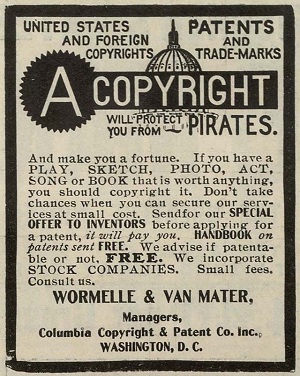 With increasingly fewer exceptions, every business that exists in the real world should also have a strong presence on the internet. This might be merely through the use of an informative website, or more frequently by staying in the minds of consumers with social media, or even by distributing the actual products themselves online (e.g. music, movies & e-books). And while much of the business-related content available on this website applies to any type of business, this article looks at concerns for startups that are heavily or entirely based on the internet.
With increasingly fewer exceptions, every business that exists in the real world should also have a strong presence on the internet. This might be merely through the use of an informative website, or more frequently by staying in the minds of consumers with social media, or even by distributing the actual products themselves online (e.g. music, movies & e-books). And while much of the business-related content available on this website applies to any type of business, this article looks at concerns for startups that are heavily or entirely based on the internet.
Obtaining Limited Liability with the Commonwealth of Massachusetts
Many online Massachusetts businesses may never need to worry about seeking limited liability status. “Affiliate Marketers,” for example, or websites that merely refer internet traffic to actual merchants, have little to worry about for purposes of their owners’ liability. Another example might be an artist who sells paintings or recordings of her music over the internet. Paintings and music rarely result in an injury causing liability to their creators, though certain lawyers might try their best.
But just as many internet based businesses operating out of Massachusetts do need to concern themselves with forming an LLC or S Corporation. Selling something as simple as jewelry or furniture, or any goods at all could eventually lead to a lawsuit. Consider what might happen if a necklace is ingested by a toddler, or if a chair breaks under the weight of an elderly person. The older and more successful a business becomes, the more risk it takes on, as more of its goods will be out in the world. So placing an LLC or INC after the name of a business, and registering with the state, is actually like a cheap insurance policy in many ways.
(Read: Why you shouldn’t use an online business to form your online business.)
Choosing the Right Online Business Name in Massachusetts
 While we’re on the subject of names, sometimes entrepreneurs believe that having the right business name is the key to success, or an essential part of the business brand. And although this belief is somewhat exaggerated, the name of a business does determine several important factors that can aid in its success. These are very basic factors like how easily a business may be found, or how consumers can distinguish one business from another. In an online context, where the world is viewed on an LCD screen, these factors are even more critical:
While we’re on the subject of names, sometimes entrepreneurs believe that having the right business name is the key to success, or an essential part of the business brand. And although this belief is somewhat exaggerated, the name of a business does determine several important factors that can aid in its success. These are very basic factors like how easily a business may be found, or how consumers can distinguish one business from another. In an online context, where the world is viewed on an LCD screen, these factors are even more critical:
Local Search: When someone uses a search engine for nearby services or products they might do so with the help of geolocation services (e.g. Google Maps). For this type of listing, the name of a business isn’t so important as much as making sure the business is listed in many online local directories. Locally calibrated search engines then aggregate this data for consumer convenience.
Location Search: People often need to find a service or good in a specific location that is not local. They might be planning a trip, or a move, or they might be seeking out a good or service for a family member or friend. These types of searches can be conducted on Google Maps, but they are just as frequently performed on a regular search engine using 1) the name of the location and 2) the type of business. To locate our business, for example, people use the search query “Cape Cod Attorneys.” Using a location in a business name can therefore help in these types of searches.
Traditional Search: For the normal (and most common) searches conducted on engines like Google, Bing or Yahoo, choosing the right name can have a great impact on starting a Massachusetts online business. This type of search is especially vital for businesses seeking to transact with national and international customers, and not just a local population. Of course this type of search is also the most competitive. In traditional search a name’s “uniqueness” or “distinctiveness” should be the focus. While having a unique name strengthens any business brand, it is all the more critical for those casting a wider national or international net.
The distinctiveness of a business name is important because if, for example, the business name is not a word used in language, there should be no competition for it online. Similar principles apply to gaining Trademark protection for the name. Trademark law has created a range for “marks” that corresponds to their potential for protection. A mark that is merely “descriptive,” like “Red” would have a harder time getting Trademark protection than a mark that is “fanciful,” like “Reebok” which isn’t a word at all.
Protecting the Intellectual Property of a Massachusetts Online Business
 This is a good opportunity to bring up the idea of protecting intellectual property for an online business. What protections are available in practice will vary greatly depending on the business, but there are generally 4 different avenues (methods of protection) to be considered:
This is a good opportunity to bring up the idea of protecting intellectual property for an online business. What protections are available in practice will vary greatly depending on the business, but there are generally 4 different avenues (methods of protection) to be considered:
Trademarks: As described above, a trademark is a type of mark that is in some way connected to goods or services on the market. Filing with the Federal government grants the trademark holder with protection against the confusion of his mark with that of another.
Patents: Filed for at the same federal agency that handles Trademarks, Patents are protections that generally cover some new or novel device. These can be very technical in nature, and should always be handled by a patent attorney who is familiar with the science involved. Patent law is one of the few fields that require the attorney to be a specialist.
Copyrights: Another method of protection obtained via federal filing, a copyright is generally an expression (as opposed to an idea) that is recorded in some way. As an example one cannot copyright the skyline of New York City, whereas one can copyright a picture of that skyline. While many people recognize artwork, movies and music as traditional copyrights, expressions like computer programs can be protected as well.
Trade Secrets: These are rights that can be created by contract, and they are just as they sound. The holder of a killer brownie recipe, for example, really has no way to protect that recipe – except by keeping it a secret. Copyrights cannot offer any protection to a recipe. Policies of the business will ultimately provide this protection. Contracts too, can be drafted to ensure that employees and joint venturers do not later use the trade secrets of a business for their own enrichment.
An online business in Massachusetts that is beginning operations therefore needs to constantly consider all of these available intellectual property protections. Then, depending on the nature of the business, and the business’ financial ability, it should be aggressive in obtaining those protections. So much of an online business can depend on the protection of its intellectual property assets.
Identifying Advisors in the Online Startup Process
Because starting an online business in Massachusetts can literally begin in the confines of a home, entrepreneurs need to be a little more proactive in the networking process. Speaking with like-minded individuals who also operate online businesses is faster and more valuable than learning the ropes alone. This is why regions like greater San Francisco and Greater Boston are such fertile grounds for new tech companies, because there is so much talent available in the same industry. Conducting a simple web search for other kinds of businesses, not necessarily competitors, in an area is a good way to start the conversation.
Likewise, speaking and meeting with an attorney during the start-up process and throughout the business’ lifetime is the best way to ensure a business is protected on all sides. Feel free to call one of our attorneys for Massachusetts online business legal advice. Our office door (and virtual door) is always open to clients, especially entrepreneurs.



